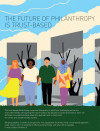 (Illustration by Andrea Mongia)
(Illustration by Andrea Mongia)
I became a nonprofit executive director at 29 years old. As the child of immigrants, I was aware of social and political inequities at an early age, which eventually led me to a career in social-impact media. By the time I found myself at the helm of a nonprofit, however, my vision of what that work would be and what it entailed had become two separate matters. The years that followed were the most challenging of my career.
The Future of Philanthropy Is Trust-Based

The trust-based philanthropy movement has grown in rapid time, but there are still basic misunderstandings about this approach and its bold vision for a more just and democratic society. This supplement illustrates what a trust-based approach really means, why it is essential to effective philanthropy, and what will be possible if more funders embrace it. Sponsored by the Trust-Based Philanthropy Project
As a young nonprofit executive, I averaged 60-hour workweeks, often working on grant proposals late into the night. I struggled to maintain my confidence and well-being as I juggled my responsibilities. I still shudder to think of my traumatic experiences during those years. Once, a funder berated me on a conference call, criticizing my “lack of preparedness” in front of my peers. In another instance, I spent days designing a strategic plan for a funder on a topic he was passionate about and never received a dime. Then there was my most destabilizing experience: A new program officer at one of our longtime funding institutions abruptly ended my organization’s renewal funding, slashing our budget by one-third overnight.
Anyone who has worked in a nonprofit leadership role has confronted similar dynamics. They are symptoms of a toxic culture in philanthropy. Yet these affronts are so common that our sector has tacitly accepted them under the guise of “due diligence” and “strategic philanthropy.”
When philanthropy holds the reins this tightly, it cannot create the conditions necessary to advance social change. Inevitably, nonprofits’ missions are undermined when they spend most of their time meeting funders’ demands. This produces the ultimate irony: Funder behaviors and norms inhibit nonprofits’ ability to achieve the impact they want to see.
A Wake-Up Call for Funders
For years, nonprofit leaders’ calls for change have gone largely unheeded, despite compelling arguments for shifting power dynamics and normalizing unrestricted funding. Studies have shown that philanthropic norms have inhibited nonprofit impact and exacerbated racial inequalities.
The tide finally began to turn in 2020, when, in response to the COVID-19 pandemic, political turmoil, and global uprisings for racial justice, funders began to reexamine their work at every level. Many dropped onerous reporting requirements. They moved money quickly, with fewer strings attached. They converted restricted grants to general operating support so nonprofits could pivot to meet unforeseen needs.
Of course, sector-wide change does not happen spontaneously. Years prior to the sea change of 2020, a small group of funders had been organizing around a shared approach rooted in trust and collaboration. They listened deeply to what nonprofits needed. “Trust us” was the message from nonprofits. Following that cue, these funders pooled their time and resources to influence others. Inspired by their vision and motivated by my personal experience, I joined them in building the campaign that would eventually become the Trust-Based Philanthropy Project.
A Rising Cultural Shift
The Project launched in 2020 with humble aspirations to promote six grantmaking practices to alleviate funder-grantee power dynamics. Since then, we have inspired hundreds of funders to embrace unrestricted funding, streamlined paperwork, and support beyond the check. We have shifted the narrative around conventional practices while providing tools and resources for operationalizing trust-based giving.
One insight we have gleaned is that making changes in practice is relatively easy. But trust-based philanthropy goes much deeper than grantmaking. We envision a future where nonprofits and communities are celebrated as essential contributors to social change. This trust-based future requires shifts in philanthropic mindsets and cultures, as well as the structures that scaffold them. It requires funders to relinquish their individual power to achieve a more equitable and democratic future.
Fortunately, more philanthropic leaders are stepping up to do the bold, rigorous, and infinitely more rewarding work of institutional change. They are reimagining traditional roles and structures in radical ways, including transforming organizational cultures from corporate to community-centric. These leaders recognize nonprofit health and well-being as a major ingredient in advancing social progress.
Trust-based philanthropy also expands our definitions of accountability in ways that center the needs and dreams of marginalized communities, providing a pathway to liberation and justice. Trust-based funders are modeling the kind of culture that will contribute to a more democratic future for everyone.
The stories in this supplement demonstrate that while there is no one-size-fits-all approach to trust-based philanthropy, the core values remain the same. What was once expressed on the sector’s fringes is now a chorus, with voices coming from across the United States and abroad. This movement proves how the power of an idea can reshape philanthropy, especially when funders relinquish personal power to build collective power. I hope our sector can maintain this momentum to realize a better future.
Support SSIR’s coverage of cross-sector solutions to global challenges.
Help us further the reach of innovative ideas. Donate today.
Read more stories by Shaady Salehi.

